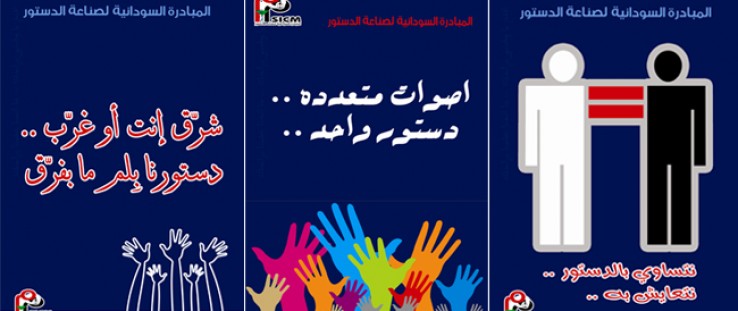 Outreach Posters from Sudan Initiative for Constitution Making. From left to right: 1. “East or West, our constitution will join us together, not rift us apart.”, 2. “Diverse voices, one constitution”, 3. “We co-exist and are equal by our constitution.”
Outreach Posters from Sudan Initiative for Constitution Making. From left to right: 1. “East or West, our constitution will join us together, not rift us apart.”, 2. “Diverse voices, one constitution”, 3. “We co-exist and are equal by our constitution.”
 Outreach Posters from Sudan Initiative for Constitution Making. From left to right: 1. “East or West, our constitution will join us together, not rift us apart.”, 2. “Diverse voices, one constitution”, 3. “We co-exist and are equal by our constitution.”
Outreach Posters from Sudan Initiative for Constitution Making. From left to right: 1. “East or West, our constitution will join us together, not rift us apart.”, 2. “Diverse voices, one constitution”, 3. “We co-exist and are equal by our constitution.”
The Republic of Sudan is at a critical juncture in its history. The interim period of the 2005 Comprehensive Peace Agreement (CPA) ended with the secession of South Sudan in July 2011, yet a concentration of wealth and political power in Khartoum continues to fuel discontent and armed conflict in several regions of Sudan—Blue Nile and Southern Kordofan states, the Darfur region, and the Abyei area, which is contested by Sudan and South Sudan.
Many of the issues of governance that affect Sudan today have arisen from the absence of a permanent constitution to govern as the supreme law of the land. A permanent constitution has eluded Sudan since its independence in 1956, and the country was no closer to a final document by 1983, when the Second Sudanese Civil War broke out. The CPA ended 22 years of war between north and south and ushered in an interim constitution for Sudan, institutionalizing arrangements for power sharing and consultative processes that had been lacking for almost 50 years. With the end of the CPA period and with South Sudan’s independence, the interim constitution became obsolete and the need for a permanent governing document for Sudan emerged again.
Worsening economic conditions (arising partly from the loss in oil revenues from the South), regional grievances that fuel conflicts, resistance to meaningful reform, and a lack of accountable governance combine to undermine Sudan’s ability to address the challenges to sustainable peace. A new constitution could offer Sudan an opportunity to address these issues.
Just days after South Sudan formally declared its independence, Sudan's President Omar al-Bashir addressed the National Assembly in Khartoum, declaring a “second republic” that would “affirm a commitment to the rule of law, the extension of justice, the propagation of a patriotic spirit, the guarantee of citizen rights, impartiality and transparency in decision making, integrity in public spending, accountability and the dependence on the standards of efficiency.”
However, many observers and Sudanese leaders of influence balked at Bashir’s proclamation, citing ongoing violent conflicts in key areas across the nation, as well as a lack of progress on the part of the government in establishing a national consultative process for a new constitution.
U.S. Special Envoy to Sudan Ambassador Princeton Lyman stressed the need for governance reform last September: “The government [of Sudan] has said that they are going to undertake a major constitutional process. Our message to the government is: This is the opportunity for the government to draw in the parties from all around the country and deal frankly with issues of decentralization of power, of wealth sharing, of new government arrangements.”
The absence of a widely accepted roadmap toward a new constitution has invigorated civil society. Organizations across Sudan have seized the opportunity by establishing forums to discuss key constitutional reforms. These civic dialogues center on creating a more democratic and inclusive government; addressing key issues such as equitable distribution of public goods and services and guarantees of civil and political liberties; and economic and social rights, including the role of women and youth.
USAID is collaborating with some of these civil society organizations to stimulate an inclusive national dialogue around good governance and democratic reform that would channel the Sudanese people’s aspirations and priorities for a permanent constitution. To support civic awareness and participation, USAID has helped fund established civil society networks that are focusing on constitutional review.
Fostering Nationwide Debate
USAID’s primary partner in this effort is the Sudanese Institute for the Development of Civil Society (IDCS), which collaborates with Sudanese civil society networks to facilitate national dialogue on a new constitution. An initiative called the Sudanese Initiative for Constitution Making provides a forum for diverse civic groups to debate specific elements of constitutional reform with the aim of reaching broad segments of the public.
The initiative convened citizen dialogues in each of Sudan’s 15 states, collecting public input on the content of a new constitution. With USAID support, IDCS and its partners have conducted more than 75 of these forums across Sudan, which were well-attended by citizens, civil society organizations, and in some locations, local government officials. The forums have worked to include women and youth as both audience members and as activists.
“We are interested in the final product that comes out of our discussions and workshops on the constitution—namely, a set of principles and rights that can be agreed upon as being important for all Sudanese,” said IDCS Chairman Abdel Mitaal Girshab. “We are interested in proper advocacy of these rights as well as the participatory, inclusive, and deliberative process in which we are currently engaged, not political maneuvering for one cause or the other. It is important for the credibility of the process that it be considered non-partisan and transparent, so we ourselves strive to remain impartial, yet passionate, in our advocacy,” he said.
To spread awareness about their activities, IDCS and its partners publish weekly pages in two local newspapers on constitutional issues and plan to publish a booklet on the importance of the constitution in daily life called “The Constitution in our Daily Food Basket.”
A series of colorful posters highlighting aspects of the constitutional process have also been produced for distribution to create a visible reminder that the process is underway. As part of its efforts to reach citizens, including those who are illiterate, IDCS has produced several songs, skits, and plays on civic participation that can be broadcast on local radio stations. “While it is evident that a new constitution for the Republic of Sudan is necessary, it is only through civic engagement and dialogue that a process of constitutional review becomes meaningful,” said USAID Democracy and Governance Team Leader Lazhar Aloui. “The work of the Sudanese Initiative for Constitution Making and other civil society groups is an investment, not just in producing a constitution document that is acceptable to the majority of Sudanese, but also in a culture of rule of law, civic participation, equitable governance, and peace.”
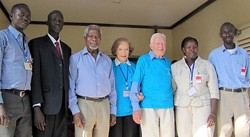
Building Civil Society, Bridging the Divide
Over the past two years, USAID, through its partner National Democratic Institute (NDI), has helped establish two networks—one based in Sudan, one in South Sudan—of nearly 100 nonpartisan civil society organizations that have created coalitions to promote citizens’ rights and democracy, including overseeing landmark election and referendum processes, and providing civic education. The Sudanese Group for Democracy and Elections (SuGDE) served Sudan, and the Sudanese Network for Democratic Elections (SuNDE) covered South Sudan.
“Through USAID funding, SuGDE and SuNDE were the only groups that were able to create a nationwide observation,” said Traci Cook, the then-NDI resident director for Southern Sudan. “That was incredibly symbolically important to see northerners and southerners working together and agreeing on an objective observation and agreeing on what they saw throughout Sudan in the elections and ultimately the referendum, [on self-determination for southern Sudan]."
Among the notable activities carried out by these networks were:
- Collaborating across the north/south divide to provide voter education for the referendum on self-determination for southern Sudan in January 2011
- Training and deploying 4,300 observers to more than 2,000 polling stations across all 25 states of northern and southern Sudan for the April 2010 nationwide elections, and more than 3,200 observers for the January 2011 referendum.
- 3,200 observers for the January 2011 referendum
- Observing voting in the May 2011 Southern Kordofan state elections
- Releasing public statements on the fairness and transparency of these processes and noting any irregularities reported by their observers
- Currently, the civil society network active in South Sudan is supporting dialogue between civil society and the government on a process to review the existing interim constitution, and draft a permanent constitution.







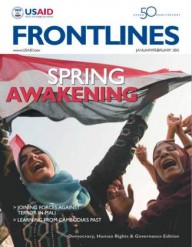

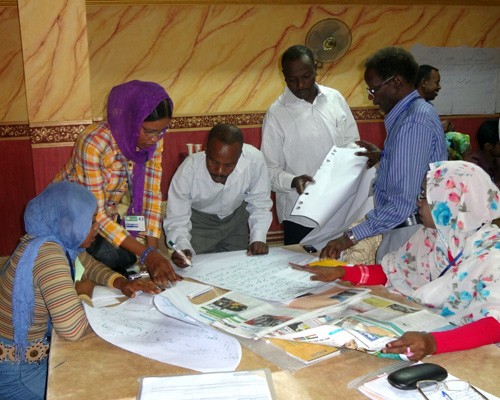
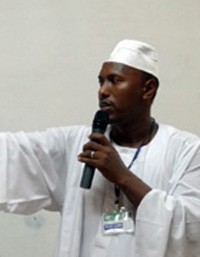
Comment
Make a general inquiry or suggest an improvement.